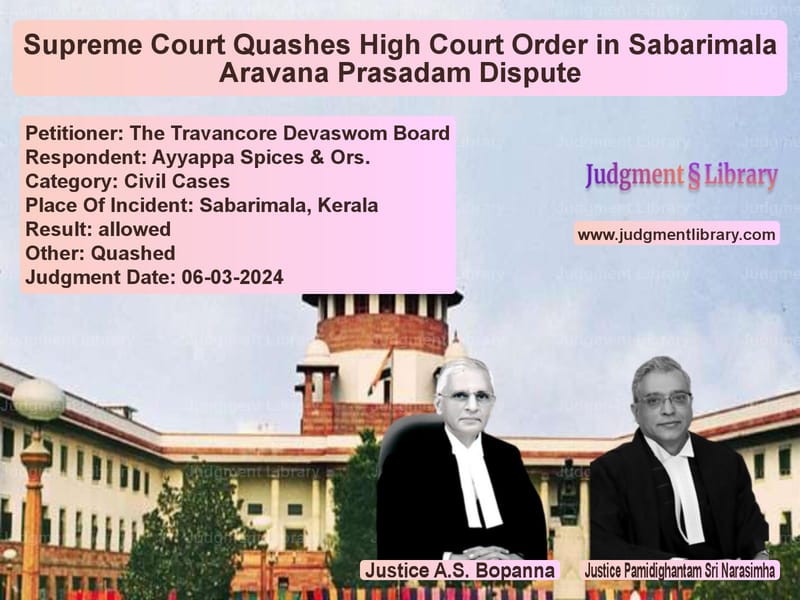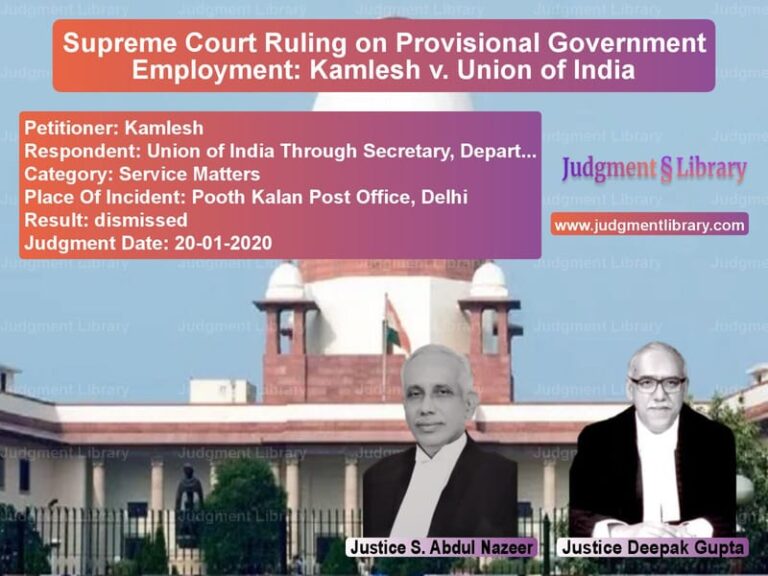Supreme Court Quashes High Court Order in Sabarimala Aravana Prasadam Dispute
The Supreme Court of India recently delivered a crucial judgment in The Travancore Devaswom Board vs. Ayyappa Spices & Ors., addressing the controversy over the quality and procurement of cardamom for the preparation of Aravana Prasadam at the Sabarimala Temple. The ruling overturned the Kerala High Court’s decision, which had halted the distribution of Aravana Prasadam and declared the Travancore Devaswom Board (TDB) a ‘food business operator’ under the Food Safety and Standards Act, 2006 (FSSA).
Background of the Case
The Travancore Devaswom Board is a statutory body responsible for managing temples in southern India, including Sabarimala. One of its key duties is the preparation and distribution of Aravana Prasadam, a sacred offering made to devotees.
The dispute began when the Board issued a tender for procuring 7,000 kilograms of cardamom for the Aravana Prasadam. The first two tenders (June 2022 and August 2022) were canceled after the supplied cardamom was found to contain pesticides beyond permissible limits. Due to time constraints before the pilgrimage season, the Board invoked an urgency clause and procured cardamom from local traders without issuing a public tender.
Following this procurement, Ayyappa Spices (a former supplier) filed a writ petition in the Kerala High Court, alleging that the Board had violated fair procurement practices and used contaminated cardamom. The High Court ruled in favor of Ayyappa Spices, leading to the Board’s appeal before the Supreme Court.
Key Legal Issues
- Whether the Kerala High Court should have entertained the writ petition filed by Ayyappa Spices.
- Whether the Travancore Devaswom Board qualifies as a ‘food business operator’ under the FSSA.
- Whether the Board’s procurement and quality-checking processes were fair and transparent.
Arguments by the Appellant (Travancore Devaswom Board)
The Board contended that:
- The High Court erred in entertaining the writ petition because Ayyappa Spices was an interested party with a commercial stake in the procurement process.
- The urgency clause was invoked due to the upcoming pilgrimage season, and local procurement was necessary to ensure uninterrupted preparation of Aravana Prasadam.
- The Board follows strict quality control measures, and independent food safety tests were conducted at government laboratories.
- Aravana Prasadam is a religious offering, not a commercial food product, and subjecting it to food safety regulations would disrupt religious practices.
Arguments by the Respondents (Ayyappa Spices & State of Kerala)
Ayyappa Spices and the State of Kerala argued that:
- The Board’s procurement process lacked transparency and was not in line with fair trade practices.
- Food safety reports confirmed that the procured cardamom contained pesticide residues exceeding the permissible limits.
- As the Board collects money from devotees for Aravana Prasadam, it qualifies as a ‘food business operator’ under Section 3(1)(j) of the FSSA.
- The High Court’s decision aimed to protect public health and ensure the safety of prasadam distribution.
Supreme Court’s Observations and Judgment
1. High Court Should Not Have Entertained the Writ Petition
The Supreme Court held that Ayyappa Spices was an interested party that had previously supplied cardamom to the Board and had participated in the earlier tenders. The Court ruled:
“The writ petition was not filed in the larger public interest but to further the business interests of the petitioner. Judicial review should not be used to further commercial rivalries.”
2. Urgency Clause Justified Local Procurement
The Court noted that the Board had made two prior attempts to procure cardamom through tenders, but all supplies failed quality tests. Given the imminent pilgrimage season, local procurement was justified:
Read also: https://judgmentlibrary.com/supreme-court-quashes-recovery-orders-in-securities-scam-case/
“The urgency clause was invoked in a fair and transparent manner. The process of local procurement involved adequate quality checks.”
3. No Evidence of Intentional Negligence by the Board
While initial tests indicated pesticide levels above the permissible limit, later tests conducted under the Supreme Court’s supervision showed that the Aravana Prasadam was fit for human consumption. The Court stated:
“There was no evidence to suggest that the Board deliberately distributed unsafe prasadam. Subsequent FSSAI tests confirmed that the prasadam was not substandard.”
4. Board Is Not a ‘Food Business Operator’
The Supreme Court ruled that the Board does not fall under the definition of a ‘food business operator’ because Aravana Prasadam is a religious offering, not a commercial product:
“The prasadam is given as a sacred offering to devotees and does not constitute a commercial food business under the FSSA.”
5. Quashing of Kerala High Court’s Order
The Supreme Court quashed the Kerala High Court’s order, stating:
“The impugned judgment of the High Court is set aside. The destruction order for the existing stock of Aravana Prasadam is also quashed.”
Implications of the Judgment
This ruling has several key implications:
- Limits judicial interference in religious affairs: The judgment upholds the autonomy of religious boards in handling prasadam distribution.
- Defines boundaries of food safety laws: Clarifies that religious offerings do not automatically fall under commercial food regulations.
- Prevents misuse of judicial review: Ensures that PILs are not used to settle commercial disputes.
- Establishes urgency clauses in procurement: Recognizes the necessity of local sourcing in time-sensitive situations.
This decision reinforces the protection of religious practices from excessive legal scrutiny while maintaining safeguards for food safety.
Petitioner Name: The Travancore Devaswom Board.Respondent Name: Ayyappa Spices & Ors..Judgment By: Justice A.S. Bopanna, Justice Pamidighantam Sri Narasimha.Place Of Incident: Sabarimala, Kerala.Judgment Date: 06-03-2024.
Don’t miss out on the full details! Download the complete judgment in PDF format below and gain valuable insights instantly!
Download Judgment: the-travancore-devas-vs-ayyappa-spices-&-ors-supreme-court-of-india-judgment-dated-06-03-2024.pdf
Directly Download Judgment: Directly download this Judgment
See all petitions in Contract Disputes
See all petitions in Consumer Rights
See all petitions in Judgment by A. S. Bopanna
See all petitions in Judgment by P.S. Narasimha
See all petitions in allowed
See all petitions in Quashed
See all petitions in supreme court of India judgments March 2024
See all petitions in 2024 judgments
See all posts in Civil Cases Category
See all allowed petitions in Civil Cases Category
See all Dismissed petitions in Civil Cases Category
See all partially allowed petitions in Civil Cases Category







